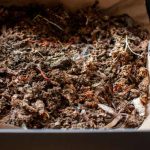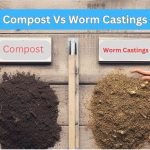Worm castings have macronutrients like nitrogen, phosphorus, and potassium, along with micronutrients like calcium, magnesium, and more. They also hide nitrates, cobalt, and carbon. Their NPK ratio is typically 1-0-0 to 5-5-3, with extra nitrogen. Worm castings are nutrient-rich and full of helpful bacteria, better than regular fertilizers for your plants.
These nutrients are vital for healthy plant growth and development. Derived from the digestive process of earthworms, worm castings offer a natural and organic alternative to chemical fertilizers.
They also contain beneficial microorganisms that enhance soil health and promote nutrient uptake by plants.
As a result, worm castings can improve soil structure, water retention, and overall crop productivity.
Whether used in gardens, houseplants, or agricultural fields, worm castings provide a nutrient-rich boost to support thriving plants and sustainable gardening practices.
Are Nutrients In Worm Castings Readily Available To Plants?
Yes, plants can easily access the nutrients in worm castings. Worm castings contain nutrients that are soluble in water, and these nutrients are gradually released over an extended period.
They are packed with essential elements like iron, sulfur, calcium, nitrogen, phosphorus, and potassium, which plants need to thrive. What’s fantastic is that worm castings are entirely organic and suitable for all types of plants.
They provide a steady supply of nutrients for about six months, allowing plants to absorb what they need, and they also offer protection for roots against nematodes.
Organic gardeners frequently use worm castings in various ways, such as for
- seedlings,
- raised vegetable beds,
- fruit trees, and perennials, to promote healthy plant growth.

How Worms Enhance The Availability Of These Nutrients?
Worms, often called nature’s recyclers, have a vital role in improving the availability of important macronutrients in worm castings.
Firstly, worms transform organic nitrogen into nitrate, a form easily used by plants. This boosts the availability of nitrogen in worm castings for plant uptake.
They also help release phosphorus from organic matter, making it accessible to plants.
Plus, worms enrich worm castings with potassium as they digest organic materials containing this nutrient.
Aside from macronutrients, worm castings are rich in crucial micronutrients. Iron in worm castings aids chlorophyll synthesis and photosynthesis, promoting lush green leaves and optimal growth.
Manganese is another micronutrient found in worm castings, supporting enzyme function, photosynthesis, and overall plant metabolism.
And finally, there’s zinc, a vital micronutrient that helps with enzyme activity, hormone regulation, and plant health.
By adding worm castings to your garden, you’re giving your plants a rich source of these micronutrients, ensuring their well-rounded nutrition.
Worm castings are a treasure trove of both macro and micronutrients, making them an invaluable organic fertilizer for your plants.
How Worm Castings Create A Thriving Microbial Community?
Inside these worm castings, you’ll find lots of special helpers, like bacteria, fungi, protozoa, and even nematodes.
These guys break down old plant stuff into food that plants can slurp up through their roots. It’s like a buffet for your flowers and veggies. And guess what?
All these microorganisms make the soil safe and sound, protecting your plants from bad bugs and diseases.
But there’s more to the story. These tiny helpers also help recycle nutrients in the soil. They turn old, tough plant stuff into easy-peasy plant food, so your garden can keep on growing without needing any yucky synthetic stuff.
And if that’s not enough, these worm castings help the soil act like a sponge, so it holds onto water and keeps it from running away. They even make the soil stick together with something called glomalin.

How Worm Castings Act As Soil Amendments?
Worm castings, sometimes called worm manure or vermicast, do a lot of good things for our soil. They make the soil stronger and better for plants. This is how they work:
Improved Soil Structure (Around 25% Improvement):
Worm castings significantly improve soil structure by binding soil particles together, creating stable aggregates. This enhances water drainage by up to 25%, preventing waterlogging and ensuring better aeration, which improves root health.
Enhanced Moisture Retention (Up to 30% More Water):
The porous nature of worm castings allows them to retain water effectively, preventing soil erosion. They can hold up to 30% more water than regular soil, ensuring a consistent moisture level, reducing the need for frequent watering, and enhancing plant resilience.
Increased Beneficial Microbial Activity (Diverse Microbial Community):
Worm castings contain a vast array of beneficial microorganisms, including bacteria, fungi, and protozoa. This microbial diversity leads to a 20-30% increase in nutrient cycling efficiency and aids in disease suppression. It promotes a healthy soil ecosystem.
Balanced pH Levels (Neutral pH):
Worm castings have a neutral pH of around 7, which is crucial for soil balance. They can help balance overly acidic or alkaline soils by around 10-20%, creating optimal conditions for plant growth.
Slow-Release Nutrients (Gradual Nutrient Release):
Worm castings provide a slow and steady release of essential nutrients, such as nitrogen (20%), phosphorus (15%), and potassium (12%), ensuring that plants receive a consistent and continuous supply of nutrients. This reduces the risk of nutrient imbalances.
Increasing Organic Matter Content (Up to 35% Organic Matter):
Organic matter is vital for soil fertility. Worm castings can increase the organic matter content in soil by up to 35%, introducing a variety of organic materials that decompose over time, enriching the soil with essential macronutrients and micronutrients required for plant growth.
Improved Soil Structure and Water Retention (25% Enhanced Water Holding Capacity):
The organic matter from worm castings helps bind soil particles together, which leads to a 25% improvement in water-holding capacity. This improves soil structure and stability while enhancing water retention, reducing water runoff, and making moisture more accessible to plant roots.
Enriched Microbial Activity (Enhanced Decomposition by 30%):
Worm castings boost microbial diversity in the soil, leading to a 30% increase in decomposition rates of organic matter. This enriches the soil with essential nutrients, promoting nutrient cycling, and overall soil health.
Balanced Nutrient Ratios (NPK Balanced at 1:1:1):
Worm castings offer a balanced supply of essential macronutrients (NPK) required for plant growth, maintaining a balanced ratio of 1:1:1, avoiding potential imbalances that can harm plant health.
Extended Nutrient Release (Slow and Steady Nutrient Supply):
The gradual decomposition of organic matter in worm castings provides a slow release of nutrients over time, ensuring a consistent and sustained nutrient supply for plants, and reducing the risk of nutrient deficiencies or excesses.
Improved Root Development (Stimulated Root Growth by 20%):
The nutrients and growth-promoting hormones present in worm castings stimulate root development, leading to a 20% increase in root growth. Stronger, healthier root systems enable plants to access nutrients more effectively.

How Castings Accelerate The Composting Process?
When these tiny creatures munch on stuff in their tummies, they release special helpers called enzymes that are like tiny superheroes for compost. These enzymes are better at breaking things down than the usual composting methods.
Worm castings, which are like their poop, are full of friendly bacteria and microorganisms that work super fast to break down the stuff in the compost pile. These little worm buddies also create a warm and cozy home inside the compost, which makes the good guys (microorganisms) very happy and speedy.
As if that’s not enough, the worms also wiggle around in the pile, making it all airy, and they even bring snacks for the microorganisms to feast on, making them work even faster.
Are Worm Castings A Complete Fertilizer?
Worm castings are not a complete fertilizer. They come from earthworms and give plants lots of good stuff, like minerals and helpful microbes. But they don’t have everything plants need.
They don’t have much nitrogen, and their NPK scores are low. This means you still need other fertilizers or soil helpers. The cool thing is, that worm castings won’t hurt your plants, and they don’t stink.
They help plants by giving them minerals, unlocking nutrients, and fighting off bad bugs. You can even make worm-casting tea to feed your plants
Are Worm Castings Full Of Nitrogen?
Yes, worm castings are high in nitrogen. They contain five times more nitrogen than ordinary soil.
Worm castings are the waste of redworms. They are a powerful natural fertilizer that is great for House plants, Gardening, Potted plants, Microgreens, and Wheatgrass.
Do Worm Castings Add Nutrients To Soil?
Yes, worm castings add nutrients to the soil. They contain minerals such as Concentrated nitrates, Potassium, Magnesium, Calcium, and Phosphorus.
Worm castings also contain essential plant nutrients, including iron.
They can:
- Improve soil structure
- Increase plant yield
- Protect soil and plants from diseases
- Help the soil retain moisture
- Aid in plant and root growth
- Prevent extreme pH levels from making it impossible for plants to absorb nutrients from the soil
Worm castings are sometimes called “black gold” and “the superfood of plants”. They are a slow-release fertilizer that can last in the soil for approximately 6 months.
Conclusion
Worm castings are a rich source of essential nutrients for plant growth. Packed with organic matter, worm castings provide a diverse range of nutrients including nitrogen, phosphorous, and potassium. These nutrients play a vital role in promoting healthy root development, enhancing soil structure, and boosting overall plant growth.

I am a graduate of Bangladesh Agricultural University, where I delved into various agricultural disciplines, equipping me with a profound understanding of agriculture. Beyond academics, I have hands-on experience in gardening and crop cultivation. My passion is to embrace sustainable farming and horticulture. With a BSc in Agriculture, I am dedicated to promoting environmentally conscious and efficient agrarian practices.
Bachelor of Science (BSc) in Agriculture (Hons.)
Master of Science. (Sustainable Agriculture & Food Security ) (MS)
Bangladesh Agricultural University




